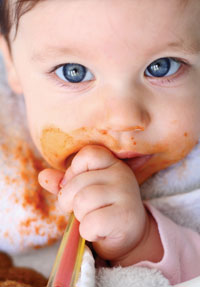 One source of parental angst that seems to bridge most cultural and
One source of parental angst that seems to bridge most cultural and
generational gaps centers around what our children do -- or do not --
eat. These concerns, which often persist long after our children have
moved out of the house for good, generally crop up during the first
year, as baby is taking her first bites of solid food.
But while our worries may have remained the same over time, the
recommendations for new eaters have not. Here is what today's
specialists have to say about getting a baby started on the road to
healthy, independent eating and solid foods.
When to start on solid foods
"A generation ago it was a source of pride to get your baby on solid foods
earlier than your neighbor," says Dr. Benci Franklin, a pediatrician at
Swedish Physicians Childrens' Clinic. "But today, we recommend starting on solid foods
at around 6 months." Before then, Franklin explains, the child's system
isn't as capable of breaking down these solid foods. "So there's greater potential
for allergies."
There are also certain signs indicating a child is ready for more than
just milk or formula. Jean Westerlund-Rice, a nutritionist with the
Public Health -- Seattle & King County WIC (Women Infant and
Children) Program, says that for one, the baby will start to show a
strong interest in the family's food. It's also important that she be
able to sit up, and can move the solid food from the front to the back of her
mouth without gagging.
"A young baby has a natural tongue thrust when they put something in
their mouth," she says. "They'll push it forward to keep things out of
the back of the throat."
So which should a parent concentrate on: the child's age, or the signs
of readiness? "My personal recommendation is to never introduce solid foods before 4 months,"
says Westerlund-Rice. "Even if the food goes down, we're not ready to
digest it" before then.
Just as introducing solid foods too early can cause problems, waiting too
long can also have adverse affects. "You have a window of opportunity
between 6 months and 1 year where you're ready to learn to eat," says
Lori Brizee, M.S., R.D., a clinical dietician at Children's Hospital
and Regional Medical Center, "and you need to be receiving solid foods
and getting more texture" during that time.
Franklin agrees. "If they don't learn (to eat) solid foods during this period, they
often have problems later on. They need to develop the oral skills
required for eating."
Solid foods to start with
When first introducing solid foods, the baby's primary food source will
still be breast milk or formula. Yet there are certain nutrients,
particularly iron, that a 6-month-old breastfed baby needs from outside
sources (this isn't as much a concern for formula-fed babies, as most
formulas today are iron fortified). "A mild iron deficiency might not
show up in a blood test," says Franklin, "but it can affect brain
development, and can show up in IQ points and overall intelligence."
The standard recommendation for baby's first food is iron-fortified
infant cereal. But, according to Westerlund-Rice, "Some research
questions the absorption of the iron from these sources. Starting with
a more absorbable iron -- meat broth or highly pureed cooked meat or
beans -- may be a better source."
Brizee also points out that some kids won't eat rice cereal. So "pureed
peas or beans...make great first foods." Other foods she suggests are
ground-up zucchini, squash or mashed bananas, or microwaved yams or
sweet potatoes.
And what about the claim that one should introduce vegetables before
fruit, since a preference for sweets may turn the child off other
foods? "I don't think there's any proven research on that,"
Westerlund-Rice says, "but I recommend people start with vegetables
because they're more nutritious."
"It doesn't matter what solid foods you introduce first. The important thing is (to
introduce them) one at a time," adds Brizee, noting to wait three to
seven days in between to detect any potential allergies.
Brizee also advises moving from spoon-fed to finger foods as quickly as
possible. "Children," she says, "won't learn to feed themselves with
fork and spoon until they learn to feed with their hands." To that end,
she recommends "any solid food that you can squish between two fingers or that
dissolves with saliva." Cooked green beans, as well as broccoli spears
and carrots that have been cooked until soft, are examples.
Solid foods to avoid
Due to a pervasiveness of allergies, Franklin recommends withholding
solid foods such as seafood, egg whites and strawberries for the first year. He also
counsels parents to avoid peanut products until kids are around age 2.
If a baby develops a rash, vomits excessively or has major diarrhea
after eating something new, Franklin says you shouldn't automatically
assume it's the food. "Stop the food, wait a couple of weeks to let the
symptoms settle down, then try again." So many things get blamed on
food allergies, he says, when the baby might have simply had a virus at
the time. "But if it happens two times, then you can assume it's not
good for the baby."
Other solid foods worth minimizing are those without a lot of nutrients, such
as fruit juice. "It's glorified Kool-Aid," Brizee says. "By the time
you squeeze the juice and throw away the pulp, you have sugar and water
left." And, she adds, juice fills kids up, so they may not have an
appetite for the healthier foods they need.
With obesity being the number-one health issue in this country, should
sweets be avoided altogether? "My rule is, don't give them sweets until
they're old enough to ask for them," Brizee says.
She adds that meat is also a solid food that we don't need to overdo. "Make
sure your first order of feeding is getting in fruits and vegetables,"
she says. "Meats are good source of iron and vitamins. But... we don't
need as much meat as the average child eats." It's a good idea, she
adds, for families to have a few vegetarian meals a week.
Laura Fine-Morrison is a mother and Seattle-based freelance writer.
Solid foods resources:
All three individuals interviewed for this article recommended Ellyn
Satter's books on feeding and nutrition:
Child of Mine: Feeding With Love and Good Sense (good nutrition book for new parents) and How To Get Your Kid To Eat... But Not Too Much (feeding young children through adolescents)
Web-based resources on nutrition and children:









